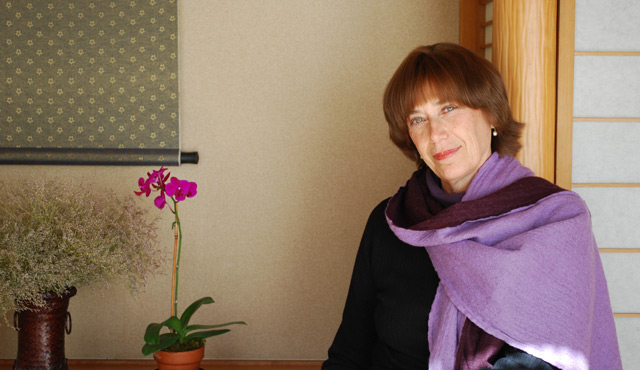5 Questions With . . . Vera Schwarcz of East Asian Studies

This issue we ask “5 Questions” of Vera Schwarcz, who spent the spring semester as a Lady Davis Fellow at Hebrew University in Israel. Schwarcz is the Mansfield Freeman Professor of East Asian Studies, professor of history, professor of East Asian studies. She returns to campus this fall.
Q: What will you remember most about your recent sojourn in Israel?
A: What lingers most in mind is the vibrant commitment to live fully the values of Jewish tradition. In Jerusalem, each day I witnessed some act of kindness, some conscious effort to reach out to strangers in a way that pays homage to the Torah in a concrete fashion. This ancient city has the power to renew the spirit. My own personal satisfaction was also enhanced by the high level of Chinese Studies in Israel today. I am currently mentoring graduate theses all over the country in addition to having taught an advanced research seminar at Hebrew University. Who could have imagined the close ties between China and Israel a few decades ago? I had not anticipated that my knowledge of East Asia would become so useful in building links between two of the oldest civilizations on earth.
Q: You are an expert on China. Do you get to that country often, and what do you make of the dramatic ways that China’s increasing economic and political power are changing society there?
A: I have been going to China at least once a year since 1977. After my longest sojourns in 1978-79 (as a member of the first group of official exchange scholars) I have not ceased to marvel at the rapid economic reforms launched by Deng Xiaoping. The pace of the transformation has been, simply put, beyond imagination. I still cannot fathom how my Chinese friends have managed to survive in such a rapidly developing society. We speak about this problem often, as well as the burden of mental illness that haunts a society still ravaged by the Cultural Revolution and the unspoken trauma of 1989. I often find myself on a street corner of Beijing (a city I know well and have written about) and cannot recognize a single landmark. This fast paced transformation has brought progress as well as much destruction in its wake. Pride in China’s growth and power sometimes takes an anti-foreign edge, as it did this last fall when I went on a Speakers Program for the State Department. The ongoing imprisonment of Liu Xiaobo (winner of the 2010 Nobel Peace Prize) highlights the remaining gap between economic gains and genuine political freedom.
Q: You are working on a new book manuscript: Chen Yinke (1890-1969): The Quiet Giant of China’s Culture Wars. What appealed to you most about him as a subject?
A: I first encountered Chen Yinke as a major figure in modern Chinese historiography. Then I began to pay attention to the way in which meticulous scholarship can become a mirror for an intellectual’s commitment to integrity in the deepest sense. As I finished another book manuscript on truth in times of historical trauma, I found myself turning more and more to Chen Yinke’s poems written between the last two decades of his tragic life. These are very difficult, dense with allusions to Chinese history. At the same time, there is a direct appeal to moral conscience, which I find myself unable to ignore. The more I read, the more obliged I became to render them into English—not exactly as translations, but as documents of the spirit that demand of us (Chinese and Westerners alike) an inner reckoning with truthful speech. These poetic renditions have emerged as the core of the new book.
Q: You are a poet as well as a historian. How does your sense of history inform your poetry, and how does your poetry influence your portrayal of history?
A: In China last October, I was asked the same question in a televised interview. It was easier to answer in Beijing because China has such a long tradition of poet-historians. Back in Connecticut, I think about my personal connection with the Holocaust. As a daughter of survivors, I grew up in Romania in a borderland between languages, and in a world where silence spoke more eloquently about the past than all the words of official history. Early on, I learned to lean on slim words, to respect the space between them, to listen to the unsayable and give it shape slowly. Later, as I began to explore oral history and the historiography of memory across cultures, I found that poetry spoke about ravage and ruination even more truthfully than documents in the archives. Some of poems written after the burning of the Summer Palace in Beijing in 1860 became part of a scholarly book, Place and Memory in Singing Crane Garden and some part of a collection of my own poems, Chisel of Remembrance. Both works were published in 2009. (Schwarcz also published In the Garden of Memory in 2005)
Q: What are your big projects for the fall semester at Wesleyan?
A: I hope to bring fresh perspectives from my sabbatical into survey courses on the history of traditional and modern China. These are timely subjects for many students, even those from Asia who come to my class looking for another angle of vision to reflect on their native cultures. In the spring, I am teaching a new seminar on “The Jewish Experience in China”—the first such course at an undergraduate institution, drawing connections from ancient Kaifeng to Shanghai during the Second World War. There are marvelous sources available now (in English, Chinese, German, French and Hebrew) which I hope to explore with a new generation of Wesleyan students. Their thirst of learning never ceases to impress and inspire me.

